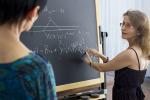
Irina Kmit
- Born inUkraine
- Studied inUkraine
- Lives inGermany
Interview
Photo Copyright: Noel Tovia Matoff, www.matoff.de
This is an EXCERPT of the interview from the catalogue “Women of Mathematics Throughout Europe, a Gallery of Portraits”, published in Verlag am Fluss 2016, [email protected], and featured among thirteen portraits in the corresponding exhibition http://womeninmath.net. See also the EWM newsarticle.
We would like to thank Sylvie Paycha, Sara Azzali, Alexandra Antoniouk, Magdalena Georgescu, and Noel Tovia Matoff for allowing us to use the interview excerpts. Moreover, we acknowledge the work of Veronica Corona and Joana Grah for editing the interview excerpts.
How and when did you choose to do mathematics?
I was born in Lviv, Ukraine. Here, Stefan Banach spent 25 years of his life (1920–1945). He was one of the greatest mathematicians of the 20th century, and his spirit is still present in this city with a long mathematical tradition. I enjoyed mathematics from an early age. (…)
We had a very good secondary education with a focus on natural sciences. I had a very strong mathematics teacher since the 8th grade (so I must have been 14 then) who was also interesting as a person. Not only did he teach us mathematics but he also encouraged us to do sports. He considered these two disciplines most important. I still enjoy sports and professional dancing very much, but stopped practicing it on a regular basis after I had my children, now 7 and 14 years old.
Were you then encouraged by your family, friends or other people around you?
The secondary school teacher I mentioned, and later my supervisor at university, encouraged me to become a mathematician. (…)
My father also supported me in doing mathematics. He noticed that, as a child, I liked to solve problems and bought me a well-known book by Perelman popularising mathematics. On the other hand, my mother, who was a doctor, tended to encourage me to study medicine. However, solving mathematical problems gave me a unique sensation of freedom that did not depend on what happened around me. I actually think that this was the reason why mathematics was so strong in the Soviet Union; in mathematics, people were able to find the freedom they missed in real life.
In retrospect, are you happy to have chosen mathematics or do you have some regrets? For you, what are the joys of mathematics? What are the hardships?
I am very happy to have chosen mathematics and have never envisaged anything else than working in mathematics. Mathematics is a language and you can express deep things in just a few words. I remember how I was charmed by the epsilon-delta formalism during my first course of analysis. You can communicate very efficiently in mathematics, which is a language without borders. Communicating with other mathematicians in this language is very exciting and enriches your life (as mathematicians usually have many other interests besides mathematics). Every mathematician has his or her own way of working and thinking. I like working with colleagues in Berlin, Vienna and Innsbruck, in Lviv, Kyiv and Novosibirsk.
I see mostly positive sides to mathematics; the only drawback I can think of is that it is not funded well enough. Applied (or sometimes seemingly applied) sciences are well funded, whereas fundamental sciences such as mathematics lack funding. I appreciate the fact that the Humboldt foundation, from which I got a fellowship for my first stay in Germany, does not follow this trend, and still supports scientists doing fundamental research.
What would you recommend to a young woman in your country wanting to start a career in mathematics?
One should feel a drive to do mathematics, and I would not recommend mathematics to someone otherwise. If a young woman feels this drive, I would encourage her to do mathematics, and not to hesitate, moving on step by step. Time will take care of the rest, and if you are patient enough you will get satisfaction from your results. I would also recommend to her to find some balance between work and family, and to enjoy both.
Could you write a few lines describing your topics of research in a manner understandable to non-experts?
Life is not uniform, it is full of singularities, with unexpected situations arising; it sometimes jumps up and then jumps down. The hyperbolic partial differential equations (PDEs) I am studying describe singularities. Sometimes the singularities come from outside, sometimes from inside, just as in real life! Hyperbolic PDEs with singularities is the world in which I am working, and it is real for me even if it looks illusory and mysterious for the general public.
